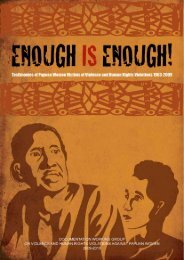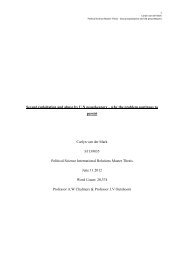The Impact of Armed Conflict on Women and Girls - UNFPA
The Impact of Armed Conflict on Women and Girls - UNFPA
The Impact of Armed Conflict on Women and Girls - UNFPA
Create successful ePaper yourself
Turn your PDF publications into a flip-book with our unique Google optimized e-Paper software.
Transiti<strong>on</strong>al Council <strong>and</strong> c<strong>on</strong>vinced UNMIK <strong>and</strong> OSCE to institute a quota for<br />
women <strong>on</strong> the lists <str<strong>on</strong>g>of</str<strong>on</strong>g> the political parties running for electi<strong>on</strong>s.<br />
Nevertheless, women are not being involved in policy-making. Gender<br />
perspectives are seldom included in policy-making or in the programmes. <str<strong>on</strong>g>The</str<strong>on</strong>g><br />
internati<strong>on</strong>al staff seem unaware <str<strong>on</strong>g>of</str<strong>on</strong>g> the above-menti<strong>on</strong>ed documents <strong>and</strong> <str<strong>on</strong>g>of</str<strong>on</strong>g> their<br />
duties in implementing them. <str<strong>on</strong>g>The</str<strong>on</strong>g> UNMIK Office <str<strong>on</strong>g>of</str<strong>on</strong>g> Gender Affairs, established in<br />
late 1999, lacks the authority, support, expertise, staff <strong>and</strong> m<strong>on</strong>ey needed to<br />
have the necessary influence. In essence, the main role <str<strong>on</strong>g>of</str<strong>on</strong>g> the Office should<br />
have been, from the beginning, to train internati<strong>on</strong>al staff <strong>and</strong> promote gendermainstreaming<br />
policies. <str<strong>on</strong>g>The</str<strong>on</strong>g> training <str<strong>on</strong>g>of</str<strong>on</strong>g> Gender Focal Points started in late 2000.<br />
In 2001, the Office, in cooperati<strong>on</strong> with UNIFEM, started training municipal staff<br />
members <strong>on</strong> gender issues <strong>and</strong> how to mainstream them into all policies. UNMIK<br />
staff, in general, does not have such training in Kosovo. Many UNMIK staff<br />
members were unfamiliar with the enormous problems facing Kosovar women,<br />
<strong>and</strong> seemingly had little interest in gender issues. <str<strong>on</strong>g>The</str<strong>on</strong>g> Swedish NGO Kvinna till<br />
Kvinna wrote the report Getting it Right? A Gender Approach to UNMIK<br />
Administrati<strong>on</strong> in Kosovo in 2001. Written by a woman who worked in OSCE in<br />
Kosovo for two years, the chapter entitled “<str<strong>on</strong>g>The</str<strong>on</strong>g> lack <str<strong>on</strong>g>of</str<strong>on</strong>g> gender awareness am<strong>on</strong>g<br />
senior staff” states that:<br />
“as the internati<strong>on</strong>al community began its rec<strong>on</strong>structi<strong>on</strong> <strong>and</strong> the work <str<strong>on</strong>g>of</str<strong>on</strong>g><br />
instituti<strong>on</strong> building in Kosovo, it so<strong>on</strong> became clear that very few, if any, <str<strong>on</strong>g>of</str<strong>on</strong>g><br />
the senior staff in the internati<strong>on</strong>al administrati<strong>on</strong> (almost exclusively men)<br />
had any underst<strong>and</strong>ing, either <str<strong>on</strong>g>of</str<strong>on</strong>g> the noti<strong>on</strong> <str<strong>on</strong>g>of</str<strong>on</strong>g> ‘gender’ or <str<strong>on</strong>g>of</str<strong>on</strong>g> ‘gendermainstreaming’.”<br />
90<br />
This is <strong>on</strong>e <str<strong>on</strong>g>of</str<strong>on</strong>g> the biggest obstacles to gender-mainstreaming in the work <str<strong>on</strong>g>of</str<strong>on</strong>g><br />
rec<strong>on</strong>structi<strong>on</strong>. Senior staff, <strong>and</strong> especially the Heads <str<strong>on</strong>g>of</str<strong>on</strong>g> Missi<strong>on</strong>s, need to be<br />
gender sensitive so that they can obtain the right kind <str<strong>on</strong>g>of</str<strong>on</strong>g> informati<strong>on</strong> <strong>and</strong> give<br />
appropriate support to missi<strong>on</strong> members who try to use a gender-mainstreaming<br />
approach.<br />
<str<strong>on</strong>g>The</str<strong>on</strong>g> United Nati<strong>on</strong>s can improve its work <strong>on</strong> gender issues, especially to<br />
ensure that the United Nati<strong>on</strong>s C<strong>on</strong>venti<strong>on</strong>s <strong>and</strong> Resoluti<strong>on</strong>s <strong>on</strong> the rights <str<strong>on</strong>g>of</str<strong>on</strong>g><br />
women are being respected <strong>and</strong> implemented. This said, it is also notable that<br />
the presence <str<strong>on</strong>g>of</str<strong>on</strong>g> UNMIK <strong>and</strong> other internati<strong>on</strong>al bodies has had a great influence<br />
<strong>on</strong> the lives <str<strong>on</strong>g>of</str<strong>on</strong>g> Kosovar women. Most important, the fighting stopped. Life is now<br />
more secure for the majority <str<strong>on</strong>g>of</str<strong>on</strong>g> the Kosovar populati<strong>on</strong>. Young people, girls <strong>and</strong><br />
boys, now have an opportunity to receive educati<strong>on</strong>, <strong>and</strong> health-care services are<br />
improving. New ideas about the human rights <str<strong>on</strong>g>of</str<strong>on</strong>g> women are being introduced<br />
<strong>and</strong> fought for, <strong>and</strong> local NGOs have had significant support in their work to raise<br />
voice <str<strong>on</strong>g>of</str<strong>on</strong>g> women <strong>and</strong> civil society.<br />
90 Getting It Right?, pp. 11-12.<br />
97




![IANSA [PDF, 2MB] - PeaceWomen](https://img.yumpu.com/25206379/1/190x123/iansa-pdf-2mb-peacewomen.jpg?quality=85)
![Commitments Sample [PDF, 93KB] - PeaceWomen](https://img.yumpu.com/25206331/1/190x245/commitments-sample-pdf-93kb-peacewomen.jpg?quality=85)










![A Toolkit for Advocacy and Action [PDF, 260KB] - Peace Women](https://img.yumpu.com/25205989/1/190x245/a-toolkit-for-advocacy-and-action-pdf-260kb-peace-women.jpg?quality=85)